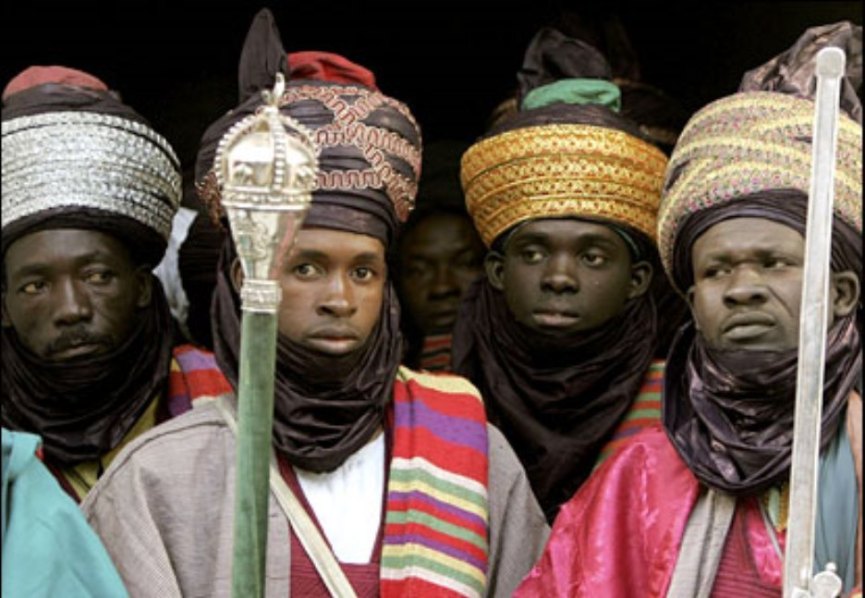List of Fulani States in Nigeria
There are states in Nigeria where Fulani people live and these areas are located in the Northern part of the country. Some call these places “Hausa Fulani states”, but we should not confuse these two ethnic groups for one another.

Although, it is common knowledge that Nigeria as a federation and sovereign African country is made up of 36 states and various capital cities, you might want to know where exactly do Fulani people reside in Northern Nigeria and how many states are occupied by the Fulani speaking tribe.
It would interest you to know that you might not find the names of Fulani states on the map of Nigeria, but these people really exist and have territories and special qualities that differentiates them from the rest.
While Northern Nigeria is predominantly occupied by the Hausa tribe, they are home for minor ethnic groups called “Fulbe” and “Fula”.
Even if they are not large as the Igbo tribe and Yoruba states in the Southern geopolitical zone of Nigeria, they are united by their culture and a common language “Fulfulde”, which is understood by all.
BRIEF HISTORY
The history of Fulani in Nigeria could be traced to the Islamic theocracy of the 19th century in Western Sudan.
The Fulani people expanded further east in the 14th century from Futa Toro in Senegal to Macina in the Niger. Later in the 19th century, they moved into Hausa land at Adamawa which was then situated in northern Cameroon.
As time passed, many of the Fulanis converted to Islam, giving up their nomadic lifestyle and stayed in urban communities of the Hausaland.
It was in 1790s that a Fulani divine, Usman dan Fodio, who at that time lived in Gobir, a northern Hausa state, rebelled against the Hausa kings which led to a jihad (Holy war).
This battle led to the division of the eastern empire of Kanem-Bornu.
Soon afterwards, Usman led another invasion of the Fulanis to the northern provinces of the emirate of Ilorin, Oyo. This was how Islam came to Yoruba land.
Usman would later split his kingdom as he gave his son, Muhammad Bello, the eastern part of the empire in Sokoto and to his brother Abdullahi, he ceded the western part, Gwandu.
This stayed towards the early 20th century when the British came and joined these empires as Northern Nigeria.

COMMON QUALITIES OF THE FULANI PEOPLE
Majority of Fulani groups live a nomadic lifestyle. They move from one place to the other and are mostly cattlemen moving around looking for pastures to feed their cows, sheep, goats and rams.
In fact, they deal mostly in trade and that is how they make their money.
Aside the nomadic lifestyle they are known for, there are other qualities of the Fulani people and states they live in, their language and even culture.
These are called “Pulaaku” and it entails that these group are well disciplined, courageous, modest, hardworking, friendly and very religious.

LIST OF FULANI STATES IN NIGERIA
The states in Nigeria inhabited by Fulani includes some areas in the North namely:
GOMBE STATE
Gombe is a Fulani state located in northeastern Nigeria and shares boundaries with Borno, Yobe, Taraba and Adamawa states respectively. The state was formed in March 1996 and has over 4.25 million residents. The state is nicknamed the “Jewel in the Savannah.” Gombe has other ethnic groups but are primarily occupied by the the Fulani speaking people who predominantly practice Islam and are muslims.
BORNO STATE
Yes, Borno is also a Fulani speaking state and is located in the North-East geopolitical zone of Nigeria. Borno shares boundaries with Yobe, Gombe and Adamawa state respectively. Formed in 1976, Borno is the second largest state in Nigeria in terms of size with Maiduguri serving as its capital city. Borno state has other Ethnic groups aside Hausa and Fulani and these tribes have been residing in this state for long. Among them include: Dghwede, Glavda, Guduf, Laamang, Mafa, and Mandara, etc. Islam is the main religion in Borno state with over 85% Muslim population while Christianity make a minority.
SOKOTO STATE
Sokoto was the former capital of the Fulani empire and is currently situated in the northwestern region of the country. Today, there is an estimated population of more than 4.2 million persons living in this state. Also, one of the most powerful kings in Nigeria, the Sultan is the head of the Sokoto Caliphate and he is seen as the spiritual leader of the Muslims in the country.
TARABA STATE
Yes, Taraba is both an Hausa and Fulani state as these tribes and languages are spoken by most indigenes irrespective of their ethnic background. Farming is the main occupation of the inhabitants of Taraba indigenes. Located in North Eastern Nigeria, its capital is Jalingo. Today, there are about 40 different tribes with their distinct languages in Taraba state.
KATSINA STATE
Within Kastina state, Fulani and the Hausas are the largest ethnic groups in the state with Sharia being practiced throughout the state, due to its Islamic background. in the northwestern geopolitical zone of Nigeria. Created in 1987, Katsina state shares common boundary with Kaduna, Zamfara, Kano, and Jigawa States. The slogan of the state is nicknamed the “Home of Hospitality”, with over 5.8 million people as its estimated population.
BAUCHI STATE
Bauchi is a northern state located in the North-East geopolitical zone of Nigeria. It shares boundaries with Kano, Jigawa, Taraba, Plateau, Gombe, Yobe and Kaduna states respectively. Formed in 1976, Bauchi is the fifth largest Nigerian state in land mass area with an estimated population of over 6.5 million residents. The state is also occupied by various ethnic groups from Bolewa, Butawa, Warji, the Fulani, Hausa, Kanuri, etc. Bauchi is among the Islamic states in Nigeria.
KEBBI STATE
Kebbi is a state situated in the northwestern region of Nigeria and has Fulani speaking tribes in its vicinity. The state is shares boundaries with Sokoto, Zamfara and Niger state respectively. Kebbi state was formed in 1991 and has an estimated population of about 4.4 million residents. Religiously, Islam is the major religion of this state with Christianity as the minority.
YOBE STATE
Yobe is a predominant Fulani state located in the northeastern region of the country. Unfortunately, it has been ranked as the most dangerous state to live in Nigeria, due to the ever threat and presence of terrorist groups such as Boko Haram and ISWAP. Yobe state was founded in 1991 and its capital is Damaturu.
CONCLUSION
Aside these major states where Fulani people can be found in Nigeria, there are other places where you can find them in the country.
Due to their nomadic way of life, you might come across them in small communities in the south-eastern states in Nigeria or even in the south-south.
Today, citizens of the country live in fear of this group and has even termed the Fulani tribe as the most dangerous tribe in Nigeria today due to the killings linked with Fulani herdsmen in the country.
